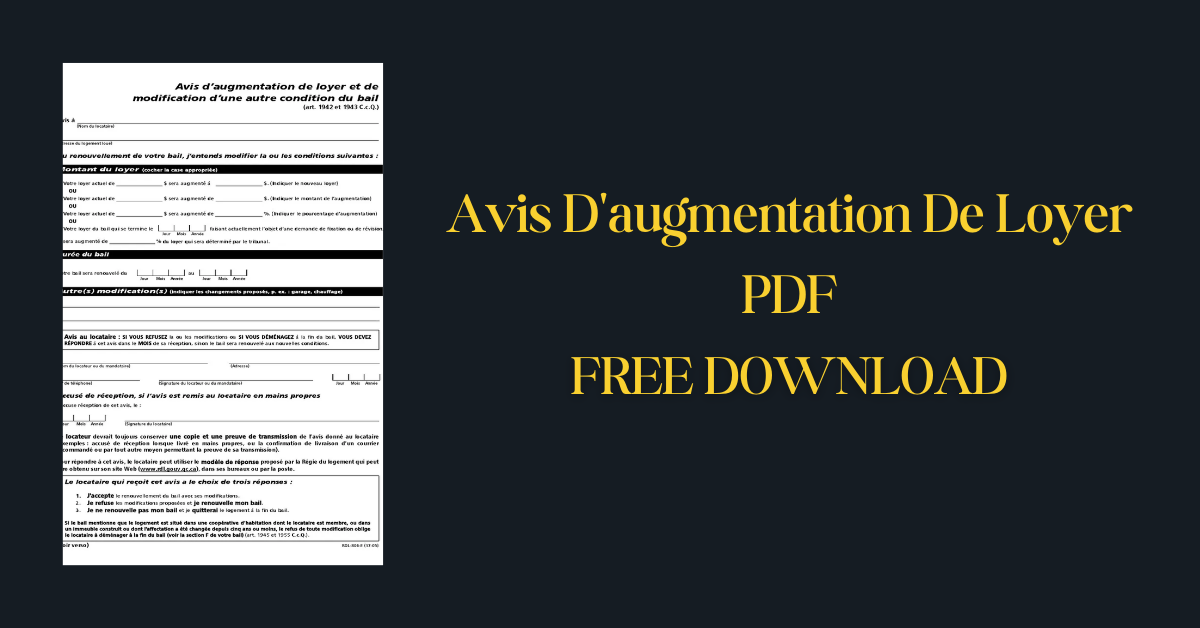An “avis d’augmentation de loyer” (literally “notice of rent increase” in French) is a formal document used by a landlord in Quebec, Canada, to inform their tenant(s) about a proposed increase in the rent.
It outlines the details of the proposed change, including the new rent amount, effective date, and potential changes to the lease agreement. This document is crucial for ensuring both the landlord and tenant understand the proposed changes and adhere to legal requirements.
| Name of the PDF | avis d’augmentation de loyer pdf |
| No. of pages | 2 |
| Category | |
| Language | English |
| PDF Link | Click Here |
Also Download
IMM 5257 Annexe 1 Francais PDF
Cahier Sommet Secondaire 2 PDF
Free Polaris Service Manual PDF
What is the Purpose of Avis D’augmentation De Loyer
The “avis d’augmentation de loyer” serves two primary purposes:
- Informing the Tenant: It formally notifies the tenant about the proposed rent increase and any other changes to the lease agreement the landlord is seeking. This ensures the tenant is aware of the potential changes and their right to respond.
- Complying with Legal Requirements: Landlords in Quebec have specific legal obligations when increasing rent. The “avis d’augmentation de loyer” serves as documentation that the landlord has met these requirements by informing the tenant within specific timeframes and with specific details. This is crucial in case of any disputes or legal proceedings regarding the rent increase.
By fulfilling these purposes, the “avis d’augmentation de loyer” helps maintain transparency and fairness between landlords and tenants in Quebec’s rental market.
Required Information in an Avis d’Augmentation de Loyer (Notice of Rent Increase)
An “avis d’augmentation de loyer” in Quebec must contain specific information to comply with legal requirements and ensure transparency for both the landlord and tenant. Here’s what needs to be included:
Landlord Information
- Full Name and Contact Information: This includes the landlord’s full legal name and contact details, such as address, phone number, and email address (if applicable).
Tenant Information
- Full Name(s) of the Tenant(s): This includes the full legal name(s) of all individuals listed on the lease agreement.
Property Information
- Address of the Rental Property: This should be the complete and accurate address of the property where the rent increase is being proposed.
- Type of Dwelling: This clarifies the type of rental unit, such as apartment, house, or other dwelling type, as defined in the lease agreement.
Notice Details
- Effective Date: This specifies the exact date from which the new rent amount will be applied.
- Increase Details: This clearly outlines the proposed increase in rent. It should be presented in one of the following ways:
- Specific Dollar Amount Increase: This clearly states the exact dollar amount by which the rent will increase.
- Percentage Increase Compared to Current Rent: This specifies the percentage increase in relation to the current rent amount.
- Specific Dollar Amount Increase: This clearly states the exact dollar amount by which the rent will increase.
- Duration (Optional): While not mandatory, the landlord may choose to specify the proposed duration of the new lease agreement with the increased rent.
- Other Proposed Changes (Optional): If the landlord wishes to propose additional changes to the lease agreement beyond the rent increase, they must be outlined in the notice. This could include changes to specific clauses, amenities, or other relevant terms.
Tenant’s Rights and Deadlines:
- Brief Explanation of Tenant’s Rights: The notice should briefly inform the tenant of their right to accept, refuse, or negotiate the proposed rent increase.
- Deadline for Response: The notice must clearly state the deadline for the tenant to respond to the proposed increase. This is typically one month from the date the tenant receives the notice.
It’s important to note that the specific content and format of the “avis d’augmentation de loyer” may vary slightly depending on the specific circumstances and resources used to create the document. However, the core information listed above is essential for ensuring legal compliance and transparency throughout the process.
What is the Deadline to Respond to Avis D’augmentation De Loyer
In Quebec, the deadline to respond to an “avis d’augmentation de loyer” (notice of rent increase) is typically one month from the date you receive it. This means you have one month to accept, refuse, or negotiate the proposed rent increase outlined in the notice.
It’s crucial to stay within this deadline to ensure your rights are protected. If you fail to respond within the timeframe, the law may interpret it as tacit acceptance of the proposed increase, and the new rent may come into effect automatically.
Here are some additional points to remember:
- Be sure to check the specific notice you received: While the standard deadline is one month, it’s always recommended to verify the exact deadline explicitly stated in the notice you received from your landlord. There may be slight variations depending on specific situations.
- Respond in writing: While not mandatory, responding in writing is highly recommended. This creates a clear record of your response and protects you in case of any future disputes. Options like registered mail or email with a read receipt can provide additional security.
- Seek resources if needed: If you’re unsure about your options or require further guidance, don’t hesitate to seek help. Government resources and tenant rights organizations in your area can provide valuable information and potential support regarding “avis d’augmentation de loyer” and your rights as a tenant.
How to Reply to Avis D’augmentation De Loyer
As a tenant who received an “Avis d’Augmentation de Loyer,” you have three options for replying:
1. Accept the increase and renew the lease:
If you agree to the proposed rent increase and wish to stay in the accommodation, you can simply do nothing. Your silence within a month of receiving the notice will be considered acceptance of the new terms.
2. Refuse the increase and renew the lease:
If you disagree with the proposed rent increase but want to stay in the accommodation under the current rent, you need to clearly state your refusal in writing within one month of receiving the notice.
You can use the following as a template:
“Je refuse l’augmentation de loyer proposée et je souhaite renouveler mon bail aux conditions actuelles.”
(Translation: “I refuse the proposed rent increase and I wish to renew my lease under the current conditions.”)
3. Not renew the lease and leave the accommodation:
If you choose not to accept the rent increase and don’t want to stay in the accommodation, you need to inform the landlord in writing within one month of receiving the notice.
You can use the following as a template:
“Je ne renouvellerai pas mon bail et je quitterai le logement à la fin du bail.”
(Translation: “I will not renew my lease and will leave the accommodation at the end of the lease.”)
Important Considerations:
- Refusing any modification to the lease, including the rent increase, requires you to move out at the end of the lease in either situation (even if option 2 is chosen).
- The document mentions specific situations where the landlord’s right to increase rent might be restricted:
- Section F of the lease mentions the accommodation being located in a housing cooperative where you are a member.
- Section F of the lease mentions the building being constructed or having its use changed within the past five years.
- Section F of the lease mentions the accommodation being located in a housing cooperative where you are a member.
- If the lease was signed on February 21, 2024, and the building was ready for use on that date, the landlord must specify the maximum rent they can charge for the next five years in the lease agreement.
Landlord’s Option in Case the Tenant Refuses the Rent Increase
If the tenant refuses the rent increase or proposed modifications, the landlord has the option to request rent fixing or rule on the lease modifications at the Administrative Housing Tribunal. This process is outlined below:
- Landlord’s Right to File: The landlord has one month from receiving the tenant’s refusal to file an application with the Tribunal.
- Cost of Application: The landlord generally bears the initial cost of filing the application.
- Potential Reimbursement by Tenant: The tenant may be ordered to reimburse the application cost if:
- The Tribunal grants a rent increase equal to or higher than the one initially proposed.
- The landlord provided the tenant with relevant data before filing the application, allowing them to make an informed decision. This data could include spreadsheets and access to invoices.
- The Tribunal grants a rent increase equal to or higher than the one initially proposed.
- Other Conditions May Apply: Additional factors may influence the final decision based on specific circumstances.
- Respecting the Tribunal’s Decision: Both the tenant and landlord are obligated to comply with the Tribunal’s ruling, whether it determines the new rent or modifies the lease terms.
- Landlord’s Inaction: If the landlord doesn’t file with the Tribunal within the timeframe, the lease automatically renews at the current rent and conditions.
Notice Requirements for Lease Changes
- Lease of 12 months or more: The landlord must notify the tenant between 3 and 6 months before the lease ends.
- Lease of less than 12 months: The landlord must notify the tenant between 1 and 2 months before the lease ends.
- Lease with an indefinite period: The landlord must notify the tenant between 1 and 2 months before the proposed change takes effect.
- Lease of a room: The landlord must notify the tenant between 10 and 20 days before the end of the fixed-term lease or before the proposed modification if the lease is of indefinite duration.
Pros and Cons of Avis d’Augmentation de Loyer
The “avis d’augmentation de loyer” (notice of rent increase) in Quebec has both advantages and disadvantages for both landlords and tenants.
For Landlords:
| Pros | Cons |
| Transparency and Compliance: The notice ensures landlords are transparent with tenants about proposed rent increases and comply with legal requirements for notifying them with specific details and deadlines. | Potential for Conflict: Negotiations with tenants may not always be successful, potentially leading to conflict or strained relationships. |
| Justification for Increased Expenses: Landlords can present their justification for the rent increase based on factors like rising costs, maintenance expenses, or property improvements. | Time and Resources: Preparing and delivering the notices, potentially dealing with negotiations, and potentially facing contests can involve time and resources for landlords. |
| Potential for Negotiation: The notice opens the possibility for negotiation with tenants who may be willing to accept a lower increase than initially proposed. |
For Tenants:
| Pros | Cons |
| Right to Information: Tenants are clearly informed about the proposed increase, allowing them to budget accordingly and make informed decisions. | Financial Burden: Facing rent increases, even if negotiated, can be a financial burden for tenants, especially if they are already facing tight budgets. |
| Right to Respond: Tenants have the right to accept, refuse, or negotiate the proposed increase, giving them a degree of control over the situation. | Limited Bargaining Power: Negotiating power may be limited for tenants, especially in areas with high demand and limited housing options. |
| Right to Contest: If tenants believe the increase is unfair or unjustified, they can formally contest it before the Régie du logement (rental board). | Stress and Uncertainty: The process of receiving a notice, making decisions, and potentially contesting the increase can be stressful and cause uncertainty for tenants. |
Conclusion
Understanding the legal framework surrounding rent increases (avis d’augmentation de loyer) is crucial for both tenants and landlords in France. Tenants should be familiar with their rights and the steps they can take to contest an unlawful rent increase.
Landlords, on the other hand, must ensure they comply with all regulations and provide proper justification for any rent hike. By adhering to these guidelines, both parties can maintain a harmonious landlord-tenant relationship and avoid potential legal disputes.
FAQs
What is an Avis d’Augmentation de Loyer?
An Avis d’Augmentation de Loyer, also known as a rent increase notice, is a formal document a landlord in France must provide to a tenant if they intend to raise the rent. The notice outlines the details of the increase, including the new rent amount, the effective date, and the justification for the increase.
When does a landlord need to provide an Avis d’Augmentation de Loyer?
Landlords must provide tenants with an Avis d’Augmentation de Loyer at least one month before the new rent takes effect. This applies to both fixed-term and open-ended leases.
What are the valid reasons for a landlord to increase the rent?
Landlords can only increase the rent for certain reasons, such as increase in property taxes, increase in maintenance costs or if the landlord has made significant improvements to the property.
What is the maximum percentage increase in rent?
There is no single national maximum percentage for rent increases in Canada. Each province and territory sets its maximum allowable annual increase guidelines, which vary and are subject to change. These guidelines can be based on factors like inflation, the vacancy rate, and changes in the Consumer Price Index (CPI). For example, the 2024 guideline is 2.5% in Ontario ; 3.5% in British Columbia and 3.25% in Montreal.
How to review the rent if it has never been done?
If the rent has never been formally reviewed and documented in a lease agreement, determining a fair baseline for any potential increase can be challenging. Research comparable rentals in your area to understand the current rental market and establish a possible fair rent value. You can also consult with your provincial or territorial tenancy board. They may offer resources or guidance on rent review processes in your specific situation.

Niketa Mulay, a seasoned content writer and editor, has over a decade of experience. With a Master’s in Journalism, she honed her skills at The Times of India and now freelances across various industries. Passionate about reading, writing, and scuba diving, she shares expert PDF guides and tips at PDFdrivehub.com.



![Avis D'augmentation De Loyer PDF What is the Difference Between a PDF and a Word Document [Key Differences]](https://pdfdrivehub.com/wp-content/uploads/2024/05/What-is-the-Difference-Between-a-PDF-and-a-Word-Document-Key-Differences.webp)
